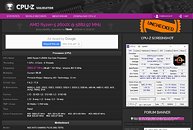Monday, April 16th 2018

AMD Ryzen 7 2700X and Ryzen 5 2600X Overclock to 5.88 GHz
PC enthusiast "TSAIK" with access to AMD Ryzen 7 2700X and Ryzen 5 2600X chips put them through rigorous overclocking to achieve speeds as high as 5.88 GHz on both, with all cores enabled, demonstrating the improved overclocking headroom AMD achieved by switching to the newer 12 nm process. The 2700X achieved 5884 MHz with a 58.25X multiplier on a 101.02 MHz base clock, and a scorching 1.76V core voltage. The 2600X, on the other hand, reached 5882 MHz riding on the same 58.25X multiplier with 101 MHz base clock, and a slightly higher 1.768V. Both chips have all their cores and SMT enabled. The 2700X was overclocked on the MSI X470 Gaming M7 AC, while an MSI X470 Gaming Plus powered the 2600X overclock. A single 8 GB G.Skill Trident-Z DDR4 module was used on both feats. As expected, a liquid nitrogen evaporator was used on both chips.


38 Comments on AMD Ryzen 7 2700X and Ryzen 5 2600X Overclock to 5.88 GHz
I'm only 600mhz behind on my 8600k, and i am on air. lulz.
I wonder if turning xfr off or removing it from chips would allow even better oc/yields.
lynx29, I'm on a 6 year old chip by architecture and it runs 5.0GHz on Air, so yours isn't special.
Here's the one from the 2700X, but this behaviour is also present on the 2600X's validation:
As can be seen, only one of the cores is @ the speed "advertised". Is this a problem with CPU-Z? I find it odd that there's such a disparity on the core's speeds.
- CPU-Z is incorrectly validating an "all cores enable" CPU when only one of the cores is @ the speed advertised
- CPU-Z is incorrectly reporting the speeds of the other cores
Can't think of anything else that might cause this.
EDIT
Just noticed that "all cores enabled" isn't the same as "all cores @ X speed". As such, it's properly validated: my bad.
I mean, in the old days you would take a cheap AthlonXP2500+, overclock it to 3200+ levels and you'd get the performance of a chip that was $100-200 more expensive.
Today, there are still some chips that overclock like crazy, but they overclock themselves by default, if there's thermal headroom. Overclocking manually rarely yields 20% on top of that. While at the same time throwing several levels of power saving under the bus.
I mean, sure, from a technical point of view, I'm still curious to see what each chip can do (and that includes air, water and LN2). It's just that real-life use cases aren't there anymore.
Put "on LN2" in the damn headline so that the fanboys who don't read any further than that, don't flood the internet with "OMG Ryzen 2 overclok teh best intel r sux!!!!111oneoneone".
Puts certain things in perspective. :rolleyes:
see sig ;)
Not only did the Greeks lose a battle they should have won at Thermopylae, the Persians ransacked Greece for about a year after that.
Or maybe that's what you meant?
but for now, I require ultimate performance, and only Sparta can give it to me.
But do tell me what an untreated 8core Intel cpu has been clocked to.
7820X is 8c16t and comes with 4.3 Ghz out of the box, on toothpaste, as a 140W TDP CPU as opposed to these 105W Ryzens on solder.
If you need reality checks, I am happy to provide...
Beyond that, yes, we know Intel is strong at single thread, but increasingly more and more things are getting multi-threaded. This is the way forward. I'd take a slightly slower single thread result for a better multi-thread result (thus the rig in my sig. When I bought it it was not the best single thread, but shed loads better multi-thread).
Oh look, we didn't drift from the topic at all!
That's right! Throw some LN2 on it. It'll fix almost anything.